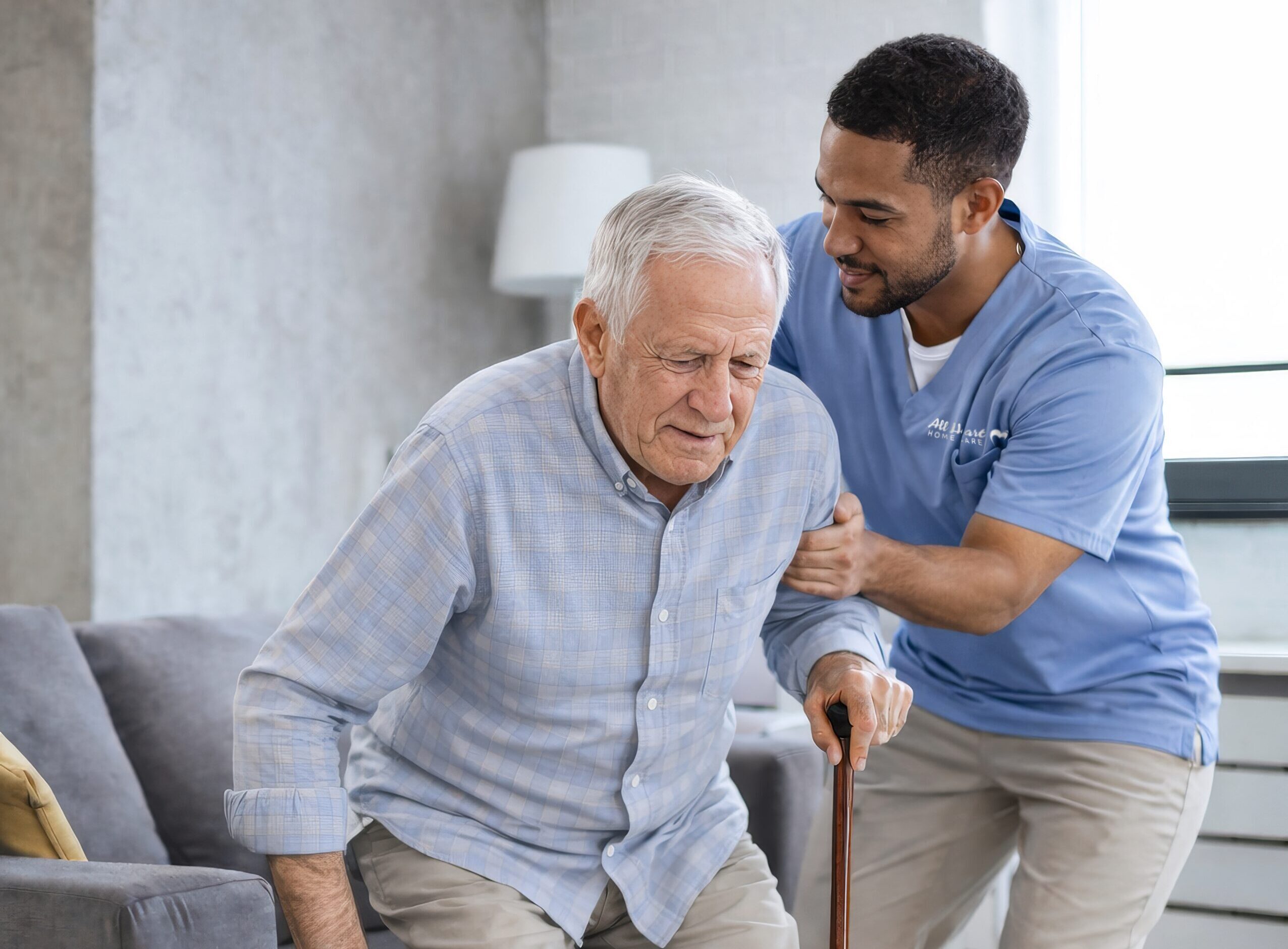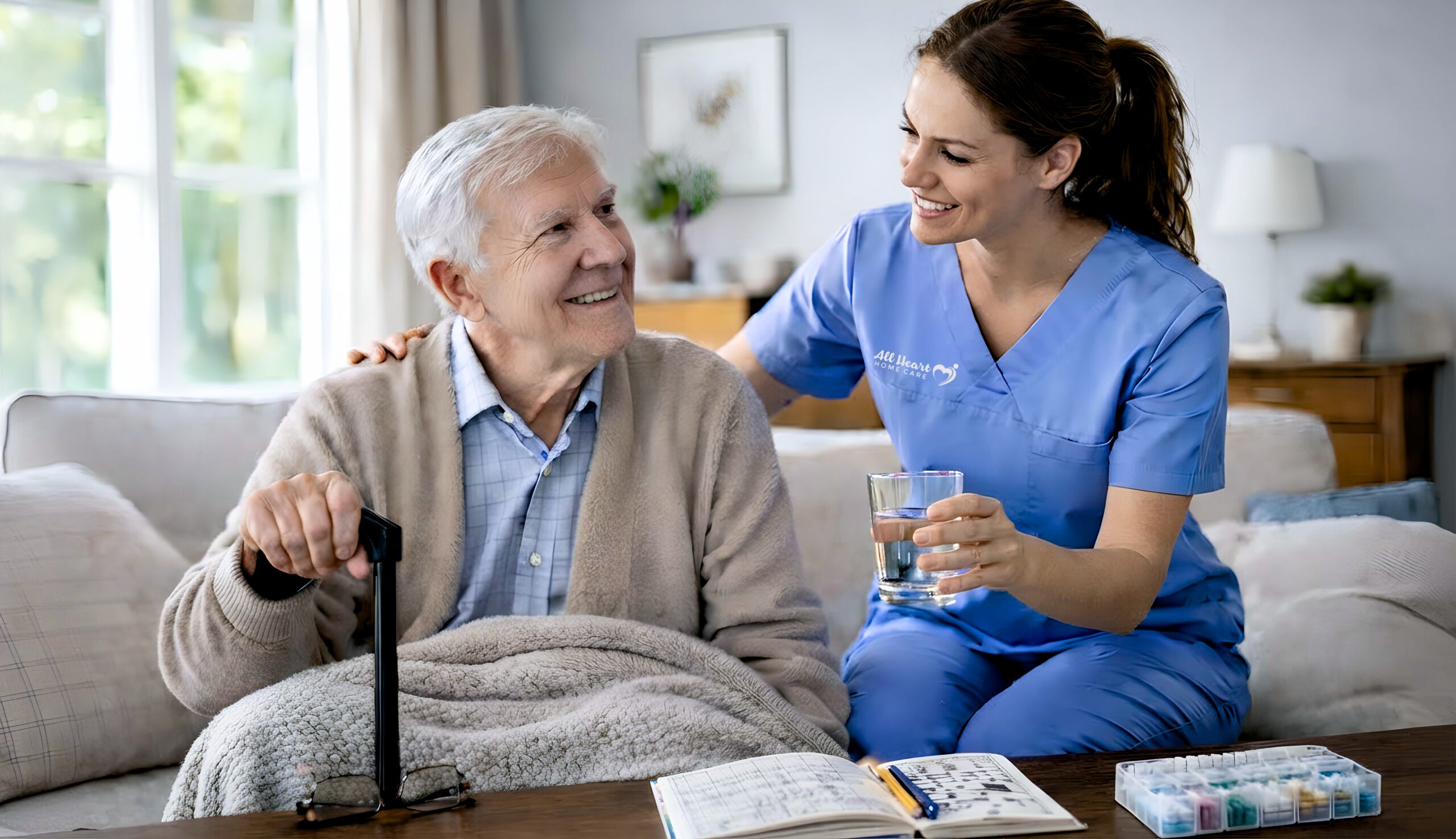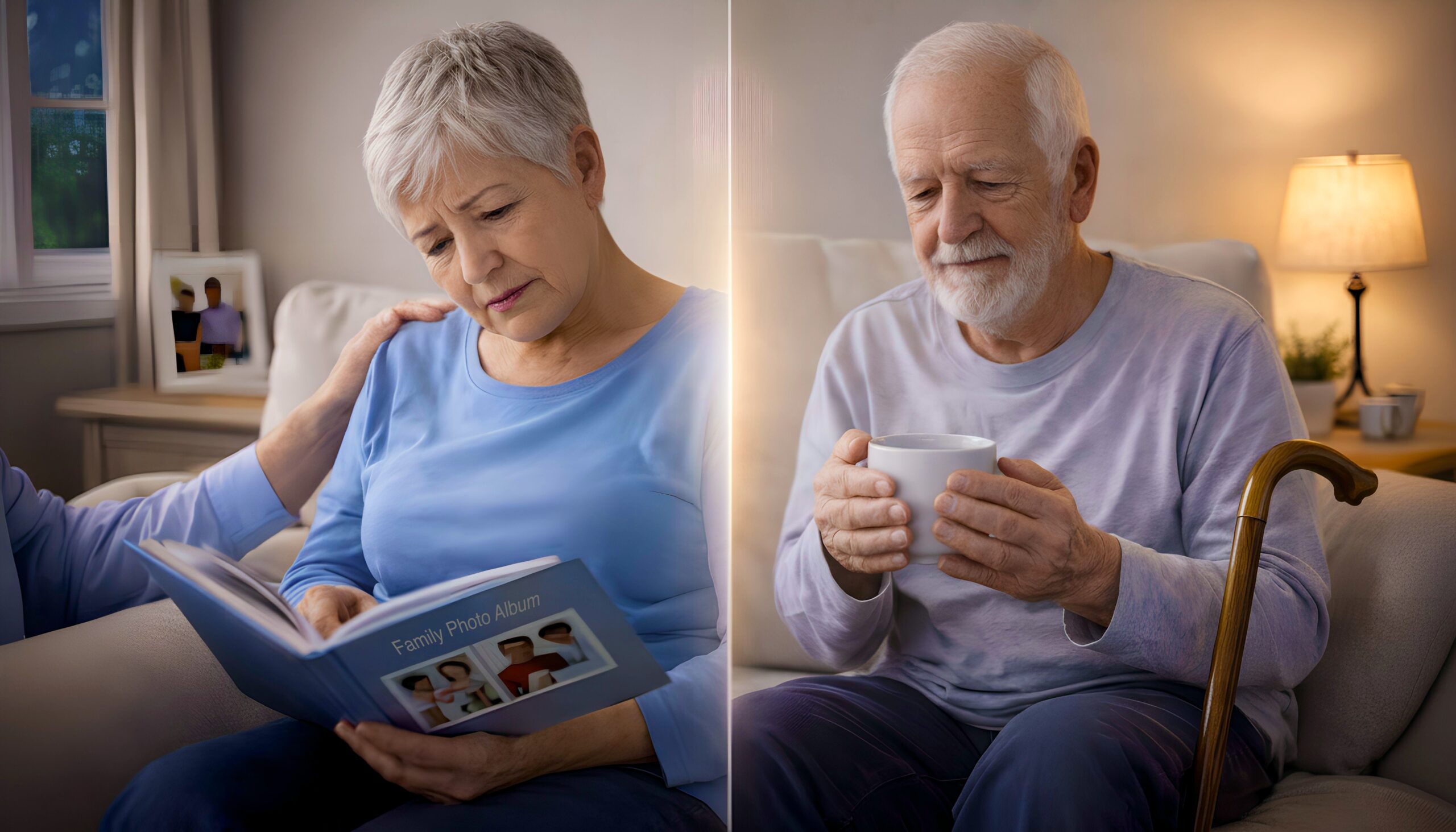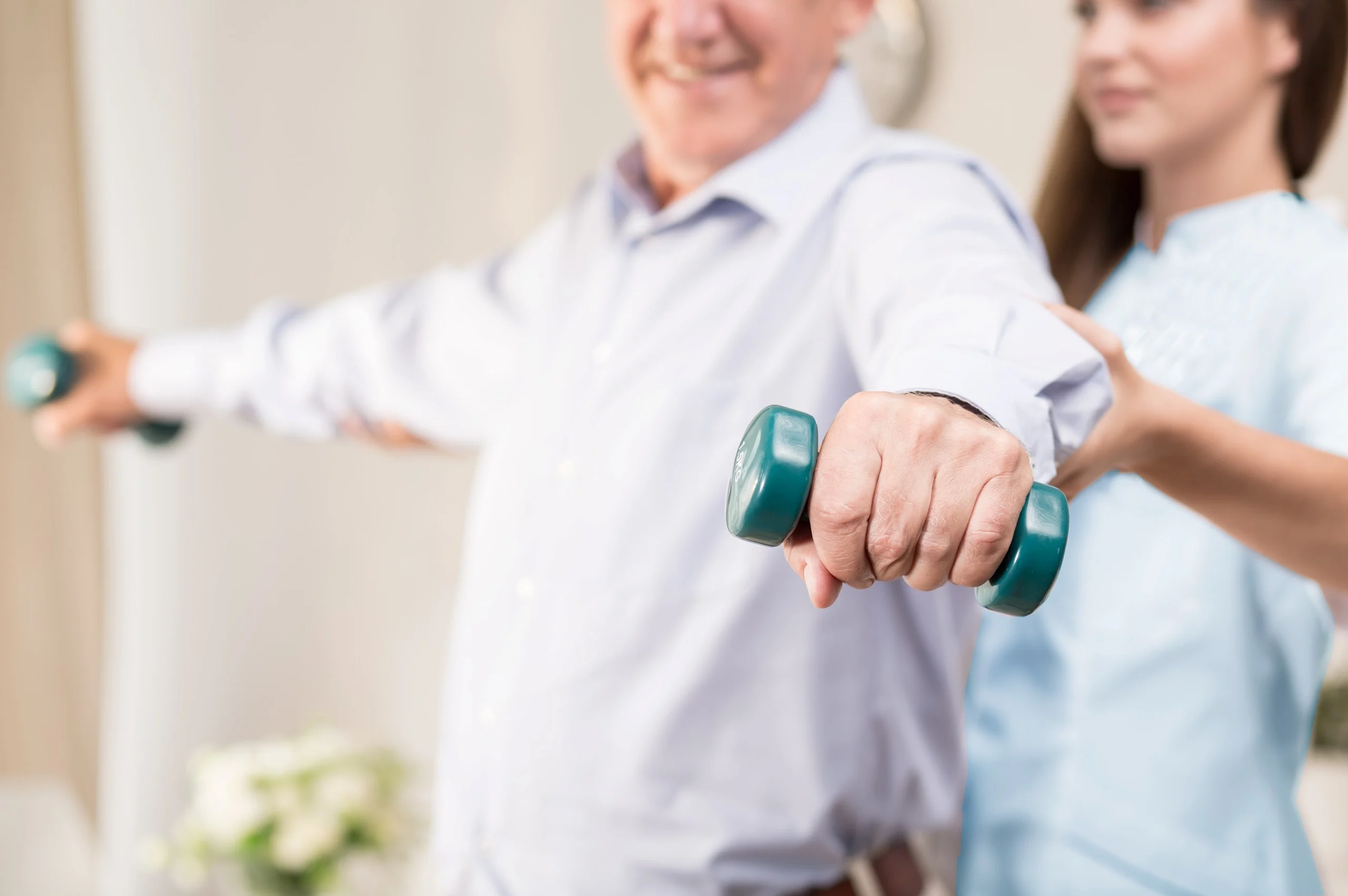Parkinson's Home Care
Steady hands. Steady care. Every step of the way.
When the tremors started, you told yourself it was nothing. When the balance changed, you adjusted. But now the falls, the freezing mid-step, the frustration on your loved one’s face when their body won’t do what their mind is asking — it’s becoming more than you can manage alone.
All Heart Home Care provides compassionate Parkinson’s home care across San Diego County. We’re a nurse-led, veteran-owned agency that’s been helping families like yours since 2014. Our caregivers are experienced in the specific challenges of Parkinson’s disease — from fall prevention and mobility support to medication timing and the emotional toll this disease takes on everyone it touches. Whether you need a few hours of weekly help or around-the-clock 24-hour care, we’re here.

This disease changes everything — and you need real support.
Nearly one million Americans are living with Parkinson’s disease, with 90,000 new diagnoses every year. It’s the second most common neurodegenerative disease in the country — and Southern California has one of the highest incidence rates in the nation.
Parkinson’s doesn’t announce itself all at once. It creeps in — a slight tremor, a shuffling step, trouble buttoning a shirt. Then the falls start. About 60% of people with Parkinson’s fall each year, and the risk of hip fracture is four times higher than in the general population. The disease affects movement, balance, speech, swallowing, sleep, and mood. And the family members trying to keep up with all of it are often running on empty.
Our Parkinson’s home care gives your family skilled, consistent support that keeps your loved one safe at home — and gives you room to breathe.
What our caregivers actually do every day.
Parkinson’s care isn’t a checklist. It’s adjusting — in real time — to a body that can move freely one hour and freeze completely the next. Here’s what that looks like with All Heart Home Care:
Prevent falls before they happen.
Falls are the single biggest safety risk in Parkinson's. Our caregivers provide steady, patient mobility assistance — walking support, safe transfers from bed to chair, and help navigating stairs or uneven surfaces. We also work with your family to make practical home modifications like grab bars, non-slip flooring, better lighting, and removing tripping hazards. Prevention is always better than recovery.
Work with freezing episodes, not against them.
Freezing of gait — when your loved one's feet suddenly feel glued to the floor — is one of the most frightening symptoms of Parkinson's. Our caregivers have hands-on experience recognizing freeze triggers and use proven techniques like rhythmic cueing, visual targets, and weight shifting to help your loved one move through episodes safely and calmly.
Keep medications on schedule.
Parkinson's medications are time-sensitive. Taking levodopa even 30 minutes late can mean the difference between a good hour and a difficult one. Our caregivers provide consistent medication reminders and coordinate with your neurologist to stay current on any dosage or timing changes. On-time medication keeps symptoms manageable and your loved one more comfortable throughout the day.
Support daily living with patience and dignity.
Tremors, rigidity, and slowed movement make everyday tasks like dressing, bathing, eating, and grooming genuinely difficult. Our caregivers give your loved one the time they need — never rushing, never taking over more than necessary. We help maintain independence, routine, and self-respect in every interaction.
Encourage movement and engagement.
Exercise isn't optional for Parkinson's — it's one of the most effective tools for managing symptoms. Our caregivers support daily stretching, walking routines, and follow-through on physical therapy exercises prescribed by your loved one's care team. We also engage your loved one in activities they enjoy: music, puzzles, gardening, conversation, cooking — whatever keeps their mind active and their spirits up.
Every aspect of our Parkinson’s home care is personalized. A client with mild tremors and early-stage stiffness gets a very different care plan than someone dealing with advanced mobility loss, speech difficulties, and frequent falls. We meet your loved one exactly where they are.
Caregivers with real Parkinson's experience.
We don’t hand someone a manual and call them ready. When your family needs Parkinson’s home care, we match you with a caregiver who has hands-on experience working with Parkinson’s clients—someone who already understands motor and non-motor symptoms, safe transfer techniques, fall prevention, freezing-of-gait response, and the critical importance of medication timing. Our client relations manager personally evaluates every caregiver’s experience before placing them with your family.
But experience only gets you so far. What sets our caregivers apart is heart. They learn that your dad moves better with music playing. They know your mother needs an extra few minutes in the morning because her stiffness is worse before her first dose takes effect. They become a steady, familiar presence in a life that feels increasingly unpredictable — and that consistency matters enormously in Parkinson’s home care.

Care that grows with your loved one's needs.
Parkinson’s is progressive, and what your family needs today won’t be what you need a year from now. Our care plans evolve alongside the disease — so you never have to start over with a new provider.
Early stage: Your loved one is still largely independent but may notice mild tremors, occasional balance issues, or difficulty with fine motor tasks like writing or buttoning clothes. We provide companionship, medication reminders, light housekeeping, meal preparation, transportation to neurology appointments, and gentle encouragement to stay active. Many families start with just a few hours of hourly care per week.
Mid-stage: Daily assistance becomes essential. Balance and mobility decline, freezing episodes increase, and personal care tasks require more hands-on help. Our caregivers provide safe transfers, fall-prevention supervision, structured daily routines, and support with home physical therapy exercises. We also offer respite care so family caregivers can rest — because caregiver burnout helps no one.
Advanced stage: Your loved one may need comprehensive support for nearly every aspect of daily living. Swallowing difficulties, speech changes, and significant mobility loss require attentive, experienced care. Our 24-hour care provides constant presence—assistance with feeding, repositioning, comfort measures, and dignity throughout every moment. We coordinate closely with neurologists, physical therapists, and hospice teams when that becomes appropriate.
At every stage, our Parkinson’s home care is built around one principle: your loved one deserves to feel safe, capable, and valued — no matter how the disease progresses.
Why San Diego families trust All Heart Home Care.
- Dedicated caregivers, not rotating staff — Consistency matters when your loved one's body works differently every day. Your family gets the same experienced, familiar caregiver each visit — someone who knows your loved one's routines, triggers, and preferences.
- Veteran-owned since 2014 — We understand service, commitment, and reliability. Our military values shape how we care for your family—with honor, integrity, and genuine dedication.
- 11 years serving San Diego families —Over a decade of experience caring for your neighbors throughout La Mesa, La Jolla, Rancho Bernardo, and all of San Diego County. Local expertise you can trust.
- Low Rate Guarantee — We'll beat any comparable quote from another licensed San Diego agency. You get exceptional Parkinson's care at the best possible price — we put that in writing.
- Same-day availability for emergencies — A bad fall or a sudden decline doesn't wait for business hours. When you need help immediately, we can often arrange care within hours. Call us, and we'll move mountains to support you.
- No long-term contracts required — Use Parkinson's home care when you need it. Weekly, monthly, or just occasionally — no commitments, no pressure, no hidden fees. Complete flexibility to match your family's situation.
Let's talk about what your family needs.
You’ve been adjusting to this disease for a while now — catching them when they stumble, learning medication schedules, watching the person you love struggle with things that used to come easily. It’s exhausting, and you don’t have to carry it alone.
We invite you to schedule a free, no-obligation in-home consultation. We’ll listen to your situation, answer your questions, and build a customized Parkinson’s home care plan tailored to your loved one’s needs—not a one-size-fits-all package.

Call us today at (619) 736-4677 to speak with a care coordinator. At All Heart Home Care, we’re here with heart, expertise, and hope — ready to walk beside your family every step of the way.
Frequently asked questions about Parkinson's home care.
What is Parkinson's disease and how does it affect daily life?
Parkinson’s disease is a progressive neurological disorder that affects movement, balance, and coordination. Common symptoms include tremors, muscle rigidity, slowed movement, freezing of gait, and difficulty with balance. As the disease progresses, it can also affect speech, swallowing, sleep, and mood. These changes make everyday activities like dressing, walking, and eating increasingly challenging — which is why many families turn to professional Parkinson’s home care for support.
How much does Parkinson's home care cost in San Diego?
Our Parkinson’s home care rates start at $37 per hour, with pricing based on shift length — longer, consistent shifts receive a lower hourly rate. For visits under four hours, we offer a flat per-visit rate of $175. Families needing 24-hour care pay $960 per day with no overtime fees. We provide exact pricing over the phone during your first call — no in-home visit required. Visit our pricing page for full details.
When should we start professional Parkinson's care?
Consider professional care when you notice increasing fall risk, difficulty managing medications on schedule, struggles with personal hygiene or dressing, or when family caregivers are feeling burned out. You don’t have to wait for a crisis. Starting Parkinson’s home care early builds trust with a consistent caregiver, establishes safe routines, and helps maintain your loved one’s independence longer.
How do your caregivers help with falls and freezing episodes?
Falls are the number one safety concern in Parkinson’s — about 60% of people with Parkinson’s fall each year. Our caregivers provide steady mobility assistance, safe transfers, and home safety modifications to prevent falls before they happen. For freezing of gait episodes, we use proven techniques including rhythmic cueing, visual floor targets, and weight shifting to help your loved one move through freezes safely.
Does Medicare cover Parkinson's home care?
Medicare typically does not cover non-medical in-home care like companionship, personal care, or mobility assistance. However, long-term care insurance often does. Veterans and surviving spouses may qualify for the VA Aid and Attendance benefit, which can provide over $2,000 per month toward care. California’s Medi-Cal IHSS program offers limited coverage for eligible individuals. Our care coordinators can help you navigate these options.
Can your caregivers coordinate with my loved one's neurologist?
Yes. Parkinson’s care often involves multiple specialists — neurologists, physical therapists, occupational therapists, and speech therapists. Our caregivers help ensure adherence to home therapy exercises, monitor symptom changes, maintain medication schedules, and communicate updates to the family and medical team. This coordinated approach ensures everyone is working together to support your loved one’s health and quality of life.
LEARN. PREPARE. FIND PEACE OF MIND
Guides and expert insights on Parkinson's care in San Diego.
Supporting someone with Parkinson’s disease comes with unique challenges—from managing mobility to navigating changes in speech, mood, and daily routines. Our blogs are here to help. Inside, you’ll find thoughtful guidance, practical tools, and heartfelt encouragement to help you provide confident, compassionate care. Whether you’re new to Parkinson’s or well into the journey, these resources are here to help you and your loved one live with greater ease, dignity, and connection.

Parkinson’s Disease Dementia: A Complete Guide for Families
Parkinson’s disease is the second most common neurodegenerative disease worldwide, currently affecting an estimated 9.4 million people globally and approximately one million

Alzheimer’s vs Parkinson’s: 7 Critical Differences Families Must Know
Alzheimer’s vs Parkinson’s—it’s a question many families ask when a loved one begins showing concerning symptoms. These two conditions are the most

The Power of Movement: How Exercise Supports Parkinson’s Care at Home
Exercise is important for everyone, but for individuals living with Parkinson’s disease, it’s far more than a healthy habit—it’s a critical part
